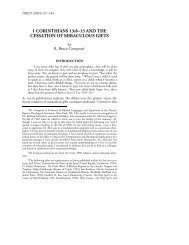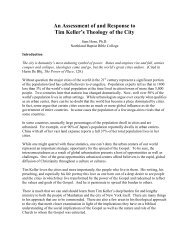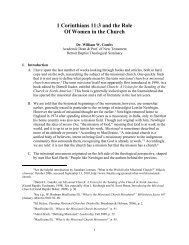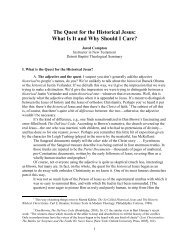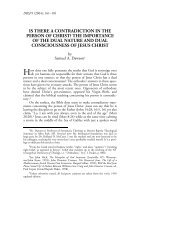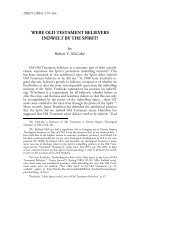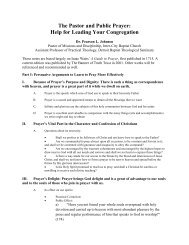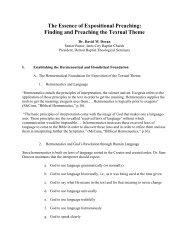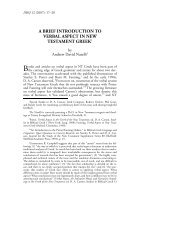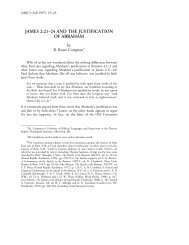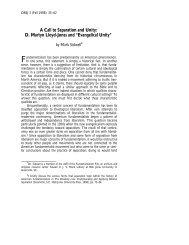Dispensational Sanctification: A Misnomer - Detroit Baptist ...
Dispensational Sanctification: A Misnomer - Detroit Baptist ...
Dispensational Sanctification: A Misnomer - Detroit Baptist ...
You also want an ePaper? Increase the reach of your titles
YUMPU automatically turns print PDFs into web optimized ePapers that Google loves.
<strong>Dispensational</strong> <strong>Sanctification</strong> 105<br />
Maintaining the Keswick perspective on the two natures within<br />
the Christian, Chaferians teach that victory over the sinful nature is<br />
accomplished by yieldedness to the Spirit in an act of dedication or<br />
surrender. 51 As with the preceding models, Chaferians separate sanctification<br />
and justification. They propose that an act of dedication on<br />
the part of the believer is necessary in order to initiate the process of<br />
sanctification.<br />
Reformed <strong>Sanctification</strong><br />
Reformed theology emphasizes the inevitable occurrence of obedience<br />
(sanctification) in the life of the justified. 52 God is seen as the<br />
primary impetus behind the believers’ growth in obedience as He<br />
prompts them to obey. 53 Believers, in turn, are responsible to obey the<br />
commands of God, but they will do so because of the sanctifying work<br />
of God in the believer’s heart. 54<br />
Before proceeding to the concluding paragraph under this model<br />
of sanctification, we would like to take note of several dispensationalists<br />
who are advocates of the reformed model. 55 These include early<br />
Evangelical Society 7 (Autumn 1994): 3–23; and Joseph C. Dillow, The Reign of the<br />
Servant Kings: A Study of Eternal Security and the Final Significance of Man (Haysville,<br />
NS: Schoettle Publishing Co., 1992). See Combs, “The Disjunction Between Justification<br />
and <strong>Sanctification</strong> in Contemporary Evangelical Theology,” pp. 31–32, for a<br />
more comprehensive listing.<br />
51 Chafer, He that Is Spiritual, p. 22; Ryrie, Balancing, pp. 186–91; Pentecost, Designed<br />
to Be Like Him, pp. 127–30.<br />
52<br />
This is basically the doctrine of perseverance, and it is affirmed by many theologians<br />
including John Calvin, Institutes of the Christian Religion, 3.3.1; A. A. Hodge,<br />
Outlines of Theology, rev. ed. (n.p.: Robert Carter and Brothers, 1878; reprint, Grand<br />
Rapids: Eerdmans, 1928), p. 522; and B. B. Warfield, Perfectionism, ed. Samuel G.<br />
Craig (Grand Rapids: Baker, 1958), p. 356.<br />
53<br />
Charles Hodge, Systematic Theology, vol. 3 (reprint, Grand Rapids: Eerdmans,<br />
1981–89), pp. 215–16, points to 1 Thess 5:23; Heb 13:20,21 and Titus 2:14 as evidence<br />
of this point. Also see Cary N. Weisiger III, “The Reformed Doctrine of <strong>Sanctification</strong>,”<br />
Christianity Today (1 September 1967): Supplement, p. 23.<br />
54 Warfield (review of He that Is Spiritual, p. 327) writes: “He who believes in Jesus<br />
Christ is under grace, and his whole course, in its process and its issue alike, is<br />
determined by grace, and therefore, having been predestined to be conformed to the<br />
image of God’s Son, he is surely being conformed to that image…. You may find<br />
Christians at every stage of this process, for it is a process through which all must pass;<br />
but you will find none who will not in God’s own good time and way pass through<br />
every stage of it.”<br />
55 Though we could also have mentioned dispensationalists who hold to the<br />
Keswick and Pentecostal views when we discussed those models, we have chosen to<br />
insert this list under the Reformed heading since most attacks against “dispensational



